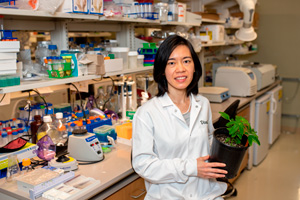|
|
|
|
|
|
 | S
|
Roadmap to Research Success
UNT continues to make tremendous strides as a Tier One research university, as the work of innovative faculty addresses real-world problems — and paves the path to a better, brighter future. A new research roadmap is a guiding force for researchers navigating a veritable maze of challenges and triumphs and arriving at potential solutions to some of today's most relevant problems. Faculty from the departments of Learning Technologies; Kinesiology, Health Promotion, and Recreation; Chemistry; and Merchandising, Hospitality and Tourism Management are reconfiguring virtual reality technology for effective learning; examining the effects of cloth masks on recreational exercise; developing solutions for pharmaceutical, agrochemical, food and cosmetic industries from fungi; and studying how consumers and restaurants communicate about allergen information. Read more in the "Roadmap to Research Success" cover story in the latest edition of UNT Research magazine, as well as other stories about how UNT researchers lead the way in confronting today's toughest challenges.
|
|
|
|
|
|
|
|
 The Future of Sustainable Fuel The Future of Sustainable Fuel
Chunliu Zhuo, a postdoctoral scholar in the lab of Richard Dixon at UNT's BioDiscovery Institute, has made a discovery that could get plant scientists one step closer to creating an economically feasible plant-based jet fuel. The research, recently published in Science Advances in a collaboration with scientists at Oak Ridge National Laboratory's Center for Bioenergy Innovation, looks at how plants make C-lignin, a compound normally found only in the seeds of certain exotic plants but that researchers hope could be introduced into biomass crops.
|
|
|
|
|
|
| Improving Health Literacy Through Graphic Novels |
Sarah Evans, an assistant professor in the College of Information's Department of Information Science, is studying whether graphic novels can be used as a medium to improve health literacy among a variety of populations. She is working with diverse populations in North Texas libraries to study the understanding of health information by adults by both reading and creating graphic novel pages. Being able to express medical issues and concerns with mediums other than words can add to research as well as the future understanding of treatment and side effects of diseases, Evans says.
|
|
|
|
|
|
|
| Outdoor Netted Facility to Further Drone Research |
|
UNT's Center for Integrated Intelligent Mobility Systems (CIIMS) will build an outdoor meshed test facility for air and ground autonomous vehicle research and development UNT Discovery Park this year. The structure will significantly increase UNT's research capacity for unmanned aerial vehicles — known as UAVs — and other emerging areas of research, including UAV cooperation with autonomous cars. The netted facility — proposed to be 80 feet high with at least a 100 by 300 ft. footprint — will allow researchers to conduct field tests in all weather conditions in full compliance of the Federal Aviation Administration (FAA), which regulates the testing of UAVs flown in open air space.
|
|
|
|
|
|
|
| Finding a Flight Path in Physics |
|
Patrick Abbott ('96, M.S. '98, Ph.D. '02) wanted to be a guitar player when he came to UNT in the 1990s, but then he discovered physics. "It was a secret language that unlocked all these things about the world that I never knew before," he says. Now, as senior application scientist for Verity Instruments, he develops spectrometers for the semiconductor industry. Abbott is featured in UNT Advising Services' Find Your Flight Path video series, which features stories from UNT alumni about how they chose their majors, what they love about their UNT experience, and where they are now — part of UNT's Career Readiness initiative.
|
|
|
|
|
|
|
| New Equipment Could Reshape Future of High Entropy Alloys |
|
A new grant from the Air Force Office of Scientific Research will allow UNT materials scientists to delve deeper into the world of high entropy alloys (HEAs). Rajarshi Banerjee, a University Regents Professor and Presidential Professor, and Rajiv Mishra, a University Distinguished Research Professor, believe a custom-built casting system will give them the ability to screen a large number of compositions of HEAs in a more efficient and cost-effective manner. This grant and the equipment will help support other projects, including one funded by a recent grant to develop the next generation of high-temperature metallic alloys that could be used for military and commercial aircraft.
|
|
|
|
|
|
|
| Kaul Named SPIE Fellow |
|
UNT engineering professor and director of the Nanoscale Materials and Devices Laboratory at UNT, Anupama Kaul, recently was elected Fellow of the Society of Photo Optical Instrumentation Engineers (SPIE) for her significant technical and societal contributions in the area of two-dimensional layered materials and nanocarbons for optoelectronics, photonics and sensing, including in flexible platforms. Director of the PACCAR Technology Institute, Kaul's interdisciplinary research on utilizing nanomaterials for optoelectronic and sensing device platforms is well recognized internationally.
|
|
|
|
|
|
|